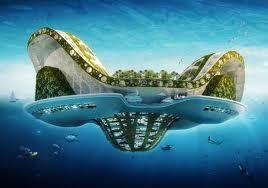Infrastructure protectionClimate change, population pressures leading to rethink of floating cities
The concepts have existed for decades, but governments and financiers, responding to the growing threat of rising tides, pollution, and overpopulation to coastal urban centers, are now beginning to take a more serious look at floating cities.

Artist's rendering of one of a multitude of floating city concepts // Source: techcn.com.cn
The concepts have existed for decades, but governments and financiers, responding to the growing threat of rising tides, pollution, and overpopulation to coastal urban centers, are now beginning to take a more serious look at floating cities..
The Guardian reports that areas of infrastructural decay around the world could benefit from reconstruction at sea. Mentioned are the vast slums of Makoko, in Lagos, which suffer from intense yearly flooding. As an example of the problem solving involved, local architect Kunle Adeyemi and his team have proposed a series of floating A-frame constructions which would completely replace the neighborhood. In order to prove the idea, the group successfully built a floating school for the community. The team even goes on to “use docking stations with centralized services, rather like hooking up a caravan to power, water, and drainage lines at a campground.”
Elsewhere in Europe, the Guardian notes, “a floating village at London’s Royal Docks has the official nod, and Rotterdam has a Rijnhaven waterfront development experiment well under way.”
Jacque Fresco, an American architect, has concerns about overpopulation on land and has spent much of his career designing similar structures through his Venus Project. His work also considers the challenges of sea-based construction and the materials research which would be necessary to make it a reality.
Members of the Seasteading Institute and the coastal engineering firm DeltaSync even go as far as to trace out the socio-political implications of sea construction. As theGuardian points out, “Patri Fiedman (of The Seasteading Institute) claims to be in active negotiations with potential host nations that would give the villages political autonomy… communities would serve as experiments in governance.”
There are already efforts underway already to create aquatic communities, and the success of these could help determine the feasibility of the idea.
The Worldis a privately owned 644-foot yacht in which 165 condominiums are available for purchase by residents as a co-ownership of the vessel itself. Also, Freedom Ship is aproposed mile-long barge which could feasibly contain 40,000 residents and a crew of 20,000. Directors of the project claim substantial Asian investor interest for the ship’s $11 billion proposed budget.
